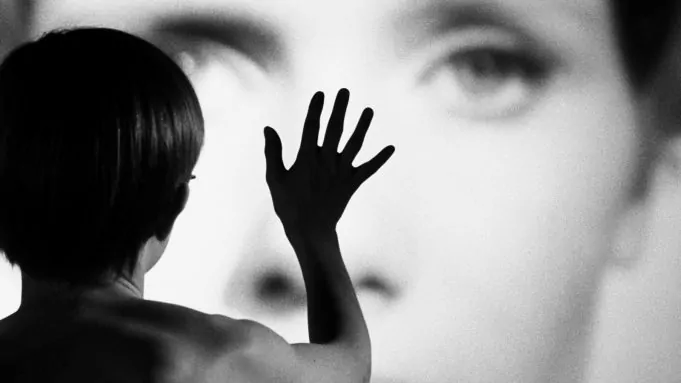A stage actress suddenly stops speaking mid-performance. Not a word. Not a whisper. For the rest of her life. This haunting premise from Persona (1966) exemplifies why Ingmar Bergman remains cinema’s most psychologically penetrating director — a master who turned cameras into X-ray machines for the human soul.
While modern filmmakers obsess over CGI spectacle and franchise universes, Bergman’s intimate character studies feel more radical than ever, their stark black-and-white frames holding mysteries that even 4K remasters can’t fully unlock.
This psychological intensity is precisely why the 2018 centennial celebration of Bergman’s birth was so significant — and why his work continues to captivate new generations.
In honor of the centennial of the art-house Swedish director’s birth, Janus Films is did us a huge favor, and brought a traveling retrospective of his theatrical films.
All told, the Bergman Centennial Retrospective featured 34 Swedish art-house classics. From his debut Crisis (1946) all the way up to his last work for the big screen, the seminal Fanny and Alexander (1982). Though ‘seminal’ could describe any of his work.
Even those who don’t necessarily dive deep into cinema will likely know Bergman from the various spoofs of his famous framing (lookup SCTV, my Canadian childhood “TV network” of choice). Often, he’ll juxtapose two characters side-by-side or from near-to-far. It’s a striking effect as seen here in this still from Persona:
The style has also become a way to jokingly poke fun at the surrealism and intellectual way that Bergman told his — multi-layered and sophisticated — stories.
Many directors to this day are influenced by Bergman’s framing and character studies. And, also: Abba! While these shots may look familiar now, at the time they were considered breakthroughs in narrative style.
Why Bergman Still Matters
Surely, some of today’s auteurs such as David Lynch (Mulholland Drive, Lost Highway, Blue Velvet, Twin Peaks, Fire Walk With Me), David Fincher (Fight Club), Robert Altman (3 Women), Francis Ford Coppola (Apocalypse Now), and maybe even the likes of Ang Lee and Todd Haynes owe at least a small debt of gratitude to Bergman.
As for me, I too throw my towel in the ring. Bergman is one of my all-time favorites. Confession, though. I’ve only ever watched one of his films. I know, sad, only one! That would be, of course, Persona (1966). It was an experience I’ll never forget, a reminder that film can be inescapably beautiful and haunting, at the same time. As we try to figure out why a stage actress has gone mute, Bergman slowly hypnotizes his unwitting audience. I’ve never seen anything like it.
After watching Persona, I hit the proverbial rewind button, and watched it again — discovering new subtleties, visual tricks, and compositions with each viewing. Then, I watched it the next evening, coercing my wife ever so gently (as I did with The Neon Demon) to join me. Again, magic. I don’t think a single film has had such impact on me before or since.
Where to Stream Bergman Today
For those unable to catch theatrical screenings, The Criterion Channel offers the most comprehensive streaming collection of Bergman’s work, featuring over 30 of his films in stunning restorations. Their collection includes not just the essentials like The Seventh Seal and Persona, but deeper cuts such as The Passion of Anna and Shame. Many titles feature new supplements, including video essays, archival interviews, and commentary tracks from scholars and filmmakers. Criterion regularly rotates their Bergman offerings, often grouping them thematically—”Faith Trilogy,” “Island Films,” or “Bergman’s Women.”
For serious cinephiles, I’ve learned in my time as a subscriber that Criterion’s presentations often surpass other streaming platforms in both visual quality and contextual materials, making it the definitive digital home for exploring Bergman’s vast psychological landscapes.
“With Persona, it’s the temptation to invent more ‘story’ that has to be resisted.“
Checkmate, Death: Bergman’s Ultimate Chess Match
Perhaps this Janus retrospective will afford me (us) the opportunity to dig past just Persona.
There’s 33 (!) more gems to discover. Likely I’ll watch The Seventh Seal (1957) next. Any time you get to witness a literal chess-match involving the devil… well, it can only be another Bergman treat in store I’m sure.
While the original Janus Films centennial tour has concluded, individual theaters and museums continue to screen Bergman retrospectives. Check your local art-house theaters and film archives for upcoming programs.
Frequently Asked Questions
Who was Ingmar Bergman?
A towering Swedish director whose deeply human, visually striking films (1940s–1980s) reshaped art-house cinema worldwide.
What does “centennial retrospective” mean?
Janus Films is touring a curated selection of Bergman’s 47 theatrical features to mark 100 years since his birth (1918–2007).
Where can I watch these screenings?
Check Janus Films’ website for listings in New York, the Bay Area (UC Berkeley Art Museum & Pacific Film Archive), and other cities.
How many films are in the retrospective?
All 47 of Bergman’s theatrical works—from his first feature, Crisis (1946), to his final big-screen masterpiece, Fanny and Alexander (1982).
Why is “The Seventh Seal” so famous?
Its iconic chess-with-Death sequence and philosophical themes make it one of cinema’s most enduring explorations of faith, mortality, and meaning.
What is Ingmar Bergman’s lasting legacy?
Bergman’s films pioneered deeply personal, psychological storytelling—his explorations of grief, faith and identity continue to inspire filmmakers and scholars alike.
How did Bergman impact cinematic style?
He popularized stark, minimalist sets, extreme close-ups, long takes and introspective pacing, shifting art-house cinema toward more interior, character-driven narratives.
Which well-known directors cite Bergman as an influence?
David Lynch, Woody Allen, Krzysztof Kieślowski, Paul Thomas Anderson and Lars von Trier have all acknowledged Bergman’s profound influence on their work.
Where can I find authoritative books or essays on Bergman?
Key reads include Ingmar Bergman: Interviews (University Press of Mississippi), Images: My Life in Film (Bergman’s memoir) and writing by film scholar Peter Cowie.
Are there online archives or museums dedicated to his work?
The Ingmar Bergman Foundation (ingmarbergman.se) and the Swedish Film Institute offer extensive archives, interviews, manuscripts and retrospectives.
Is the Janus retrospective still touring?
The 2018 centennial tour has concluded, but theaters worldwide continue to program Bergman retrospectives. Check local listings.
Where can I stream Bergman films today?
The Criterion Channel offers the most comprehensive collection with over 30 restored films and extensive bonus materials.
🔗 More on independent cinema: Independent Film Archives




